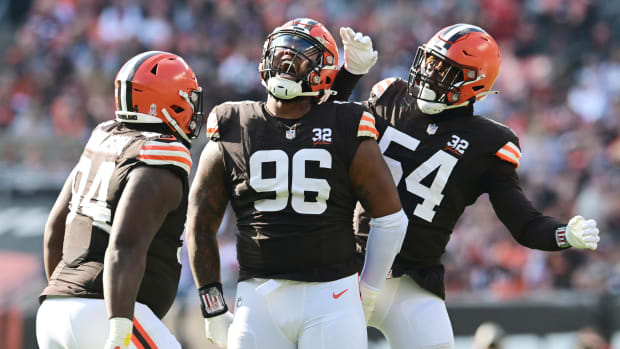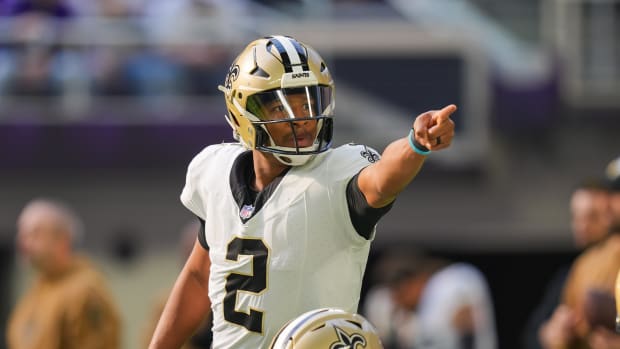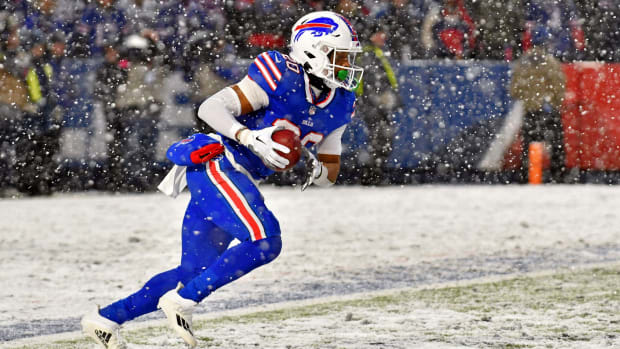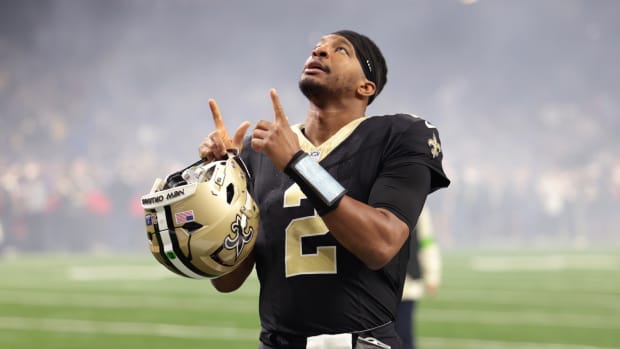A Typical Rosenhaus Tactic, Njoku Demands Trade From Browns With No Leverage
Notoriously questionable agent Drew Rosenhaus has made yet another demand for a client that is more about his own benefit than the player.
David Njoku, the fourth-year tight end, is coming off a lost year and recently had his fifth-year option picked up by the Browns in spite of it. General manager Andrew Berry was part of the group that drafted him and believes in what Njoku can be in this offense under head coach Kevin Stefanski.
Before the announcement of the fifth-year option, both Stefanski and Berry talked about their interest level in keeping Njoku and his ability to contribute within the offense. Stefanski was quick to point out that Njoku needed to do his part, alluding to some issues Njoku has had in Cleveland.
After the announcement, Njoku has expressed his excitement and has done nothing but talk about how he's ready to contribute this year and can't wait to get back to Cleveland, appearing in multiple interviews with the team's website and host Nathan Zegura.
Perhaps Njoku has had a change of heart, worrying about playing the second tight end spot behind Austin Hooper, who was signed to a lucrative contract. His targets might be down and he might feel he won't be able put up stats that will help him land a big time second contract.
Two days ago, Njoku opted to switch agents to Drew Rosenhaus and this is a common tactic Rosenhaus's agency employs.
His is agency is structured, with a very hands off approach, offering few, if any services that many others do, such as more individual attention, marketing and financial advising. Rosenhaus offers low fees and only gets paid when he's able to generate new money for his clients, so it's in his best interest to try to cause as much player movement as possible. His agency has a massive roster of clients, which enables him to be super aggressive in his approach.
If Rosenhaus makes huge demands for ten clients and two or three of them get them, he wins while there are seven or eight players that lose. It's all about playing the numbers.
One of those losers was Terrelle Pryor. Rosenhaus convinced him that he could get him a huge pay day for the Browns after he had a good 2016 season. Unable to convince the Browns to bite, Rosenhaus tried to sell Pryor to the Chicago Bears. After that failed, Pryor went to the Washington Redskins for one-year deal worth $8 million. He never recouped the money he lost, combining for just 761 receiving yards the next two years, playing for Redskins, Buffalo Bills and New York Jets.
Pryor went on the Thomahawk Podcast where he admitted he got "bad advice" from his agents, the Rosenhauses, about his market.
Njoku is under contract for two years, regardless of the team. He makes a hair over $3 million this year and $6 million in 2021 on the fifth-year option. That's unless he's able to play at such a high level it convinces a team to renegotiate next year's figure while adding on more years. That's not likely to happen in Cleveland. It's also probably not realistic or in Njoku's best interest.
His second year in the league was promising, catching 56 passes 639 yards and four touchdowns. Particularly towards the end of the year in December, his play improved significantly. Whatever good will he built up, an injury derailed his third season as did his own poor decisions.
Last year, Njoku initially wanted to wait for his broken scaphoid to heal on its own before opting for surgery several weeks later, which caused the whole recuperative process to drag on longer than it was scheduled. And when Njoku did come back, he and then head coach Freddie Kitchens did not see eye to eye, which landed Njoku in the dog house, becoming an afterthought. Many presumed that Njoku would be moved after the season.
Stefanski and Berry represented a clean slate for Njoku. Kitchens was a disastrous head coach, but Njoku was his own worst enemy at times, showing signs of immaturity and did not respond well to the issues with Kitchens. This trade demand won't help. He has to improve when it comes to catching the football and become a more consistent blocker.
Njoku turns 24 on July 10th and there's plenty to like about him. He's big, athletic and his ability to high point the ball is attractive in the red zone. Tight ends often have a significant incubation period due to the demands of the position. Njoku could be just about ready to step in and excel into his prime, especially if he's paired with a quarterback like Baker Mayfield who has loved to target tight ends and Njoku in particular.
Njoku may not be the top tight end, but he's also in an offense that should allow him to thrive in terms of efficiency. He may not see as many targets with Hooper on the team, but he should get better looks and more opportunities to make huge plays for the team, which will make him look better if he does in fact want to go elsewhere.
The advantage Njoku has with the Browns is that he is promised the next two seasons, so he should only be focused on improving and realizing the massive potential he has. At that point, maybe he can get a massive pay, which may well be from the Browns.
If Stefanski is successful, they could be in the market to keep both Hooper and Njoku in the fold for years, because they are both young and athletic, potentially giving them a dynamic duo for the next several years.
The biggest problem for Njoku and Rosenhaus is the Browns don't have to do anything. Njoku's contract figure is low and they can simply keep him. If he wants to hold out or pout, he only hurts himself. The Browns can win without him and he's not in any position to hold them hostage.
Njoku is ambitious and believes in his talent, which is important if he's going to be a great player. Unfortunately, Rosenhaus plays on that and gets players to believe he can deliver them massive paydays that are rarely there. His biggest clients aren't paid handsomely because they are Rosenhaus clients. They're paid handsomely because they are that good. There's a trail of tears and broken promises behind him.
None of this makes Njoku a bad person. He wants to be great and he wants to get paid handsomely for it. So does every other player in the NFL. The problem is being fooled into believing that Rosenhaus can lead him to a pot of gold at the end of the rainbow. It has a predatory feel to it and the NFL has not been willing to step in and do anything about it. Njoku needs good, sound advice based in reality, so he can focus on developing his talent, so that can make the demands for him.
It's possible the Browns ultimately decide to trade him, but that would have less to do with Njoku's demands and more to do with getting a solid offer and concerns that he's not going to grow up and realize his immense potential.




